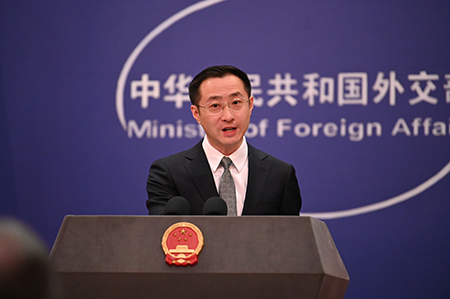“For half a century, ACA has been providing the world … with advocacy, analysis, and awareness on some of the most critical topics of international peace and security, including on how to achieve our common, shared goal of a world free of nuclear weapons.”
China Ties Nuclear Talks to Taiwan Arms Sales
September 2024
By Xiaodon Liang
China confirmed that it has rejected the U.S. offer for more nuclear arms control talks as a follow-on to a dialogue held Nov. 6. (See ACT, June 2024; December 2023).

At a July 17 press conference, Lin Jian, a Chinese Foreign Ministry spokesperson, criticized the U.S. decision to continue selling arms to Taiwan. “Consequently, the Chinese side has decided to hold off discussion with the [United States] on a new round of consultations on arms control and nonproliferation,” he said.
Lin said that China “stands ready to maintain communications” on international arms control but only if the United States respects China’s “core interests and create[s] necessary conditions for dialogue and exchange.”
In response, U.S. State Department spokesperson Matthew Miller said on July 17 that the Chinese decision to entangle nuclear arms control talks with U.S. arms sales to Taiwan “undermines strategic stability” and “increases the risk of arms race dynamics.” He added that the United States remains open to “developing and implementing concrete risk-reduction measures.”
Since the meeting last November, the United States has announced the approval of several foreign military sales packages for Taiwan. Approvals of these packages do not always result in arms contracts or arms deliveries.
In December 2023 and February 2024, the U.S. Defense Security Cooperation Agency announced that the State Department had approved the transfer of two bundles of various military electronics and related support services to Taiwan worth $300 million and $75 million, respectively. Contracts for these items will be tendered by the United States.
On June 5, the agency announced the potential sale of $300 million in F-16 spare and repair parts for Taiwan’s air force, to be taken out of U.S. Air Force stock. On June 18, the agency announced the approval of a transfer to Taiwan of $360 million in loitering munitions and unmanned aerial vehicles.
These transfers are administered by the U.S. government. The Taiwanese government negotiates commercial arms purchases directly from U.S.-based contractors, but data on approval of these transfers are published by the State Department on an annual basis only.
In April, Congress approved and President Joe Biden signed into law a supplemental foreign military aid package that included an appropriation of $2 billion in foreign military financing for Taiwan. This sum, which may be used for loans and loan guarantees, supplements a $300 million fund created as part of regular fiscal year 2024 State Department appropriations.
Congress authorized military financing for Taiwan in the fiscal year 2023 defense authorization act, but did not appropriate funds in the same budget cycle.
Last August, the Biden administration notified Congress that it would offer $80 million in military financing support for an arms transfer to Taiwan for the first time, Reuters reported. The program normally is used for sovereign states.
